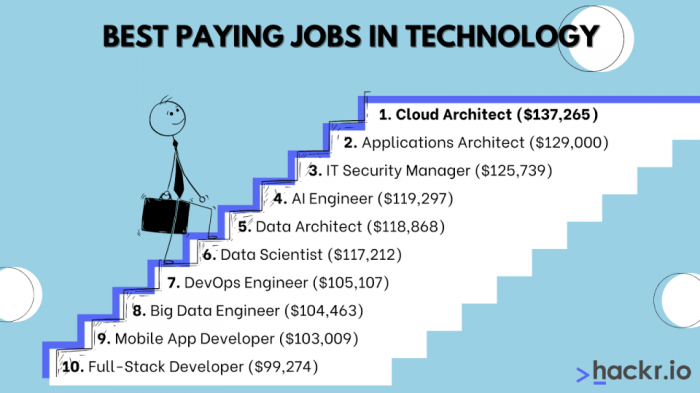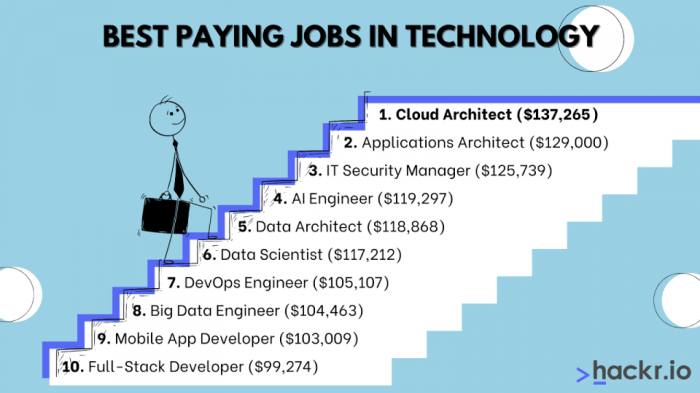Tech jobs not trending * – Tech jobs not trending: a phrase that evokes a sense of uncertainty in a constantly evolving industry. While some tech roles have skyrocketed in popularity, others are fading into the background, leaving many professionals wondering what the future holds. This shift is driven by a combination of factors, including automation, outsourcing, and the emergence of new technologies that are reshaping the landscape of the tech workforce.
The rapid pace of technological advancement has created a dynamic environment where the demand for certain skills fluctuates constantly. Roles that were once highly sought after, like traditional software developers, are now facing competition from automation and AI. Meanwhile, new roles in areas like cybersecurity, data science, and cloud computing are experiencing explosive growth.
Understanding these trends is crucial for tech professionals who want to navigate this evolving landscape and secure their future success.
The Changing Landscape of Tech Jobs
The tech industry is a dynamic and ever-evolving landscape, with rapid advancements in technology driving constant change. This evolution significantly impacts the demand for tech jobs, creating new opportunities while rendering some roles obsolete. Technological innovations and market trends play a crucial role in shaping the emergence of new roles and the decline of others.
Examples of Declining Tech Jobs
The rapid pace of technological advancement and evolving market trends often lead to the decline of certain tech jobs. As new technologies emerge and industries adapt, some roles become outdated or less in demand. Here are some examples of tech jobs that were once highly sought after but are now declining in popularity:
- Fax Machine Technicians:The widespread adoption of email and other digital communication methods has significantly reduced the need for fax machines and the technicians who maintain them.
- Typists:The advent of word processing software and personal computers has largely replaced the need for dedicated typists.
- Dial-up Internet Technicians:The transition to broadband internet connections has rendered dial-up internet services and associated technicians obsolete.
- Film Processors:The shift from film to digital photography has eliminated the need for film processors.
- Travel Agents:The rise of online travel booking platforms and websites has significantly reduced the demand for traditional travel agents.
Factors Contributing to the Decline of Certain Tech Jobs
The tech landscape is constantly evolving, with new technologies emerging and old ones becoming obsolete. This dynamic environment leads to the rise and fall of certain tech jobs. Several factors contribute to the decline of specific tech roles, driven by advancements in automation, globalization, and changing consumer preferences.
In this topic, you find that 3 european hubs better work life balance is very useful.
Automation and AI
Automation, powered by artificial intelligence (AI) and machine learning (ML), is rapidly transforming the tech industry. AI algorithms can now perform tasks previously requiring human expertise, leading to a decline in demand for certain tech jobs.
“AI is automating tasks that were once thought to be uniquely human, such as driving cars, translating languages, and writing news articles.”
[Source
World Economic Forum]
- Data Entry and Processing:AI-powered tools can automate data entry and processing tasks, reducing the need for manual data input. This has impacted jobs like data entry clerks and administrative assistants.
- Customer Service:Chatbots and virtual assistants powered by AI are increasingly handling customer service inquiries, reducing the need for human customer service representatives.
- Software Testing:AI-powered testing tools can automate software testing, reducing the need for manual testing by quality assurance engineers.
Globalization and Outsourcing
Globalization and outsourcing have also contributed to the decline of certain tech jobs in developed countries. Companies can now access a global pool of skilled tech workers at lower costs, leading to job displacement in domestic markets.
- Software Development:Many software development tasks are now outsourced to countries with lower labor costs, such as India and China. This has led to a decline in demand for software developers in some developed countries.
- IT Support:IT support tasks are also often outsourced to countries with lower labor costs.
This has impacted the demand for IT support professionals in some developed countries.
- Web Design and Development:Web design and development tasks are increasingly being outsourced to countries with lower labor costs, impacting the demand for web designers and developers in some developed countries.
Adapting to the Evolving Tech Job Market

The tech industry is constantly evolving, with new technologies and trends emerging at a rapid pace. This dynamic landscape presents both opportunities and challenges for tech professionals. To thrive in this environment, it’s crucial to embrace a mindset of continuous learning and adaptation.
Strategies for Adapting to the Changing Job Landscape
Adapting to the changing job landscape requires proactive measures. Tech professionals need to stay ahead of the curve by continuously learning and upskilling. This involves acquiring new skills, keeping up with emerging technologies, and adapting to evolving industry demands.
- Continuous Learning:Embracing a lifelong learning approach is essential. Stay updated on the latest technologies, frameworks, and tools by taking online courses, attending conferences, and engaging with industry publications. Platforms like Coursera, Udemy, and edX offer a wide range of courses covering various tech topics.
- Upskilling:Identify skills in high demand and focus on developing them. For example, if you’re a software developer, consider acquiring skills in cloud computing, artificial intelligence, or data science. These skills are in high demand and can open up new career opportunities.
- Acquiring New Skills:Don’t be afraid to venture outside your comfort zone and explore new areas. If you’re a front-end developer, consider learning back-end development or vice versa. Cross-functional skills are highly valued in today’s tech industry.
The Importance of Networking, Tech jobs not trending *
Networking plays a vital role in navigating the evolving tech job market. Building relationships with industry professionals can provide valuable insights, job opportunities, and support.
- Attend Industry Events:Conferences, meetups, and hackathons offer excellent opportunities to connect with professionals in your field and explore new trends.
- Join Online Communities:Engage in online forums, social media groups, and professional networks like LinkedIn to connect with peers and industry experts.
- Mentorship:Seek out mentors who can provide guidance and support as you navigate your career path.
Examples of Successful Career Transitions
Numerous tech professionals have successfully transitioned their careers by adapting to the changing job market.
- From Web Developer to Data Scientist:A web developer with a strong foundation in programming languages and data structures could transition into data science by acquiring skills in data analysis, machine learning, and statistical modeling.
- From Software Engineer to DevOps Engineer:A software engineer with a passion for automation and infrastructure could transition into DevOps by acquiring skills in cloud computing, containerization, and continuous integration/continuous delivery (CI/CD).
- From IT Support Specialist to Cybersecurity Analyst:An IT support specialist with an interest in security could transition into cybersecurity by acquiring certifications and skills in penetration testing, ethical hacking, and incident response.
Future Trends in Tech Jobs: Tech Jobs Not Trending *

The tech landscape is constantly evolving, driven by rapid advancements in technology and changing market demands. Understanding future trends in tech jobs is crucial for professionals to stay ahead of the curve and adapt to the evolving job market.
The Impact of Emerging Technologies
Emerging technologies are reshaping the tech industry and creating new opportunities and challenges for professionals. These technologies are driving innovation and automation, leading to the creation of new roles and the transformation of existing ones.
- Artificial Intelligence (AI) and Machine Learning (ML):AI and ML are transforming industries by automating tasks, improving decision-making, and creating personalized experiences. This has led to a surge in demand for professionals with expertise in AI and ML, such as data scientists, machine learning engineers, and AI specialists.
- Cloud Computing:Cloud computing has become ubiquitous, enabling businesses to access computing resources on demand. This has created a need for cloud architects, cloud engineers, and cloud security professionals.
- Internet of Things (IoT):The IoT is connecting devices and collecting data, creating opportunities for developers, data analysts, and cybersecurity professionals.
- Blockchain Technology:Blockchain technology is transforming industries like finance, supply chain management, and healthcare. This technology is creating demand for blockchain developers, cryptographers, and security experts.
- Virtual and Augmented Reality (VR/AR):VR and AR technologies are creating immersive experiences in gaming, entertainment, and education. This has led to a demand for VR/AR developers, designers, and content creators.
The Role of AI and Machine Learning
AI and ML are playing a significant role in shaping the tech workforce of tomorrow. They are automating tasks, enhancing decision-making, and creating new job opportunities.
- Automation:AI and ML are automating repetitive tasks, freeing up human workers to focus on more creative and strategic work. This has led to the creation of roles like automation engineers and robotic process automation (RPA) developers.
- Data Analysis and Insights:AI and ML are enabling businesses to analyze vast amounts of data and extract valuable insights. This has created demand for data scientists, machine learning engineers, and data analysts.
- Personalization and Customization:AI and ML are enabling businesses to provide personalized experiences to customers. This has created roles like personalization engineers and AI product managers.
High-Demand Tech Jobs in the Future
Based on current trends and projections, several tech jobs are expected to be in high demand in the coming years.
- Data Scientists and Analysts:The demand for data scientists and analysts is expected to continue to grow as businesses rely more on data-driven decision-making.
- AI and ML Engineers:AI and ML are transforming industries, leading to a surge in demand for professionals with expertise in these fields.
- Cloud Architects and Engineers:Cloud computing is becoming increasingly prevalent, creating a need for cloud professionals.
- Cybersecurity Professionals:As cyber threats become more sophisticated, the demand for cybersecurity professionals is expected to increase.
- Software Developers and Engineers:Software development is a core function in most industries, and the demand for software professionals is expected to remain high.


